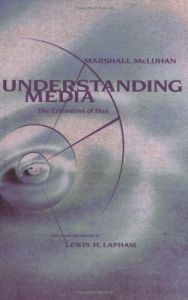Join getAbstract to access the summary!

Join getAbstract to access the summary!
Marshall McLuhan
Understanding Media
The Extensions of Man
MIT Press, 1964
What's inside?
The next time you hear some twenty-something Internet guru spouting off about how technology is changing society, tell him that Marshall McLuhan said it better in 1964.
Recommendation
Reading Understanding Media brings to mind the old line that Shakespeare’s plays are nothing but a bunch of clichés. McLuhan’s 1964 look at the impact of technology and communications on society is laced with phrases that have become fixtures of modern language, like ’Global Village’, ’Age of Information’ and ’The medium is the message’. The book seeks to tie together big themes like art, culture, and social and economic history. While often successful at drawing these sweeping connections, McLuhan in certain chapters wanders into what sound like self-indulgent lectures. His analysis of television as a "cool" or low-resolution medium is dated. Phrases like "dig it" and too-numerous references to "the bomb," Mad magazine and skin-divers clearly belong to the early 1960s. But this book is valuable for its prophetic analyses. McLuhan’s prediction of an emerging information-based economy and a global integration facilitated by the Internet and digital technologies is stunningly accurate. getAbstract.com recommends Understanding Media to executives working in media, telecommunications and technology, all of whom should have at least a passing knowledge of this classic.
Summary
About the Author
Marshall McLuhan was born in Alberta, Canada, and received a Ph.D. in English Literature from Cambridge University. He taught at the University of Wisconsin, the University of St. Louis, and the University of Toronto. In addition to Understanding Media, he wrote The Mechanical Bride and The Gutenberg Galaxy.

















Comment on this summary